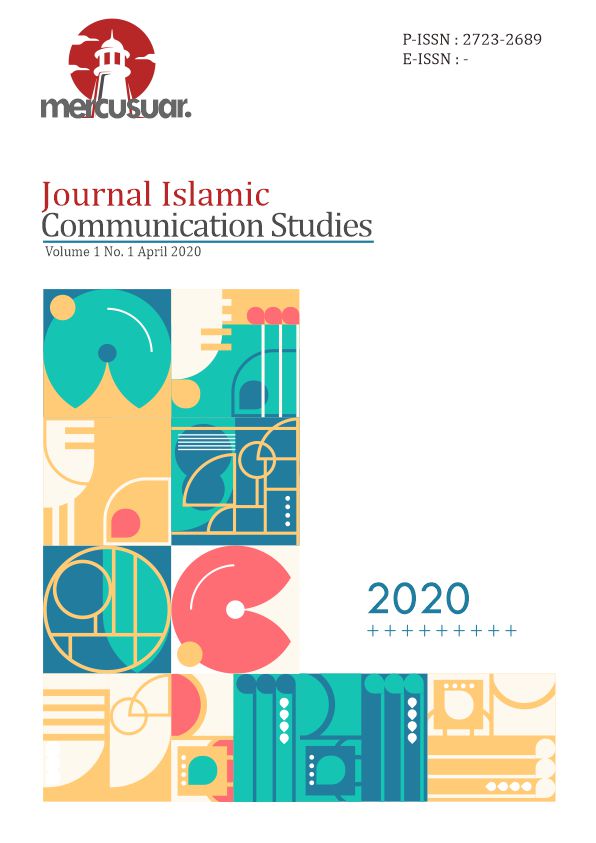Etiquette of Speaking in the Perspective of Islamic Communication.
Abstract
Humans are destined by Allah to be able to communicate or talk in interacting with other human beings. Many factors underlie a person's ability to communicate well, including education, environment, culture, and others. If a person's character is good, their speech in communication will also be good and vice versa. Adab al-bicara or manners of speaking in communication from an Islamic perspective is behavior that is in accordance with the Qur'an and Hadith after sincere reflection and only for the sake of Allah. The method used in this study is discourse analysis, which has been elaborated by an expert who has expressed his thoughts on etiquette in speaking from the perspective of Islamic communication. The purpose of this study is to understand the concept of adab in Islam and adab in speaking from the perspective of Islamic communication. Adab al-bicara or manners of speaking according to Islam is related to politeness, kindness, and good manners which are very necessary in communicating with others in everyday life. As for adab in speaking in the perspective of Islamic communication, they include being truthful in speaking, speaking well or being silent, not backbiting, looking at the interlocutor's face, being enthusiastic, not interrupting the conversation, and avoiding arguments.
Downloads
References
Al-Attas, Syed Muhammad Naquib, Islam: The Concept of Religion and The Foundation of Ethic and
Morality, T.t.: tp., t.th.
Al-Attas, Syed Muhammad Naquib, Konsep Pendidikan dalam Islam: Suatu Kerangka Pikir Pembinaan
Filsafat Pendidikan Islam Bandung: Mizan,1987
Al-Attas, Syed Muhammad Naquib, Risalah untuk Kaum Muslimin, Kuala Lumpur: ISTAC, 2001
Alauddin al Mutqi al-Hindi Burhan Fauri, Kasratul amal fi Sunani Akwali wa al-Afali , T.t.: Muasasah ar- Risalah, t.th.
Al-Jurjani, Syarif, Kitab Ta‟rifaat, Beirut: Maktabah Lubnaniyah, 1995
Al-Mawardi, Adab ad-Dunya wa ad-Din. Beirut; Dar al-Fikr, t.th
al-Sijistaniy, Abi Daud Sulaiman bin al-Asy‟at al-Azdi, Sunan Abi Daud, no. 4167, Bairut: Dar al-Fikr,1994 M/1414 H
Al-Tirmidhi, Jamius Shahih al-Tirmidzi, Beirut: Dar Turats, t.th.
al-Turmudziy, Abi Isa Muhammad bin Isa bin Saurah bin Musa bin al-Dahak al-Salmi, Al-Jami’ al- Shahih, Sunan al-Turmudziy), Juz IV, Bairut: Dar al-Kutub al-„Ilmiyah, 1994
Arsjad, Maidar dan Mukti U.S., Pembinaan Kemampuan Berbicara Bahasa Indonesia, Jakarta: Erlangga, 1993
Badaruddin, Kemas, Filsafat Pendidikan, Analisis Pemikiran Syed M.N. Al-Attas, Jogjakarta: Pustaka Pelajar, 2009
Departemen Agama RI, al-Qur’an dan Terjemahnya, Semarang: Toha Putra, 1989
Ernawati, Upaya Meningkatkan Adan dan Etka Bicara Secara Islami Pada Anak Minoritas di Sekolah
Master Depok, dalam Jurnal Abdimas Volume 3 Nomor 2, Maret 2017
http://www.dakwatuna.com/2015/05/22/69038/adab-dan-etika-berbicara-dalam-islam/
https://www.academia.edu/38459157/Adab_Berbicara.pdf
Kartapati, Ton, Bunga Rampai Asas-Asas Penerapan dan Komunikasi, Jakarta: Aksara 1981
Mandzur, Ibnu, Lisan al-„Arabiy bab adab, Istanbul: al-Maktaba al-Islamiyah, 1380 H/1960 M Mulyana, Deddy, Ilmu Komunikasi: Suatu Pengantar, Bandung: Remaja Rosda Karya, 2001
Sa'di, Syaikh As-, Taisir Karimir Rahman fi Tafsir Kalamil Mannan Tafsir al-Qur'an alKarim, Jakarta: Buana Ilmi Islami, t.th.
Suhendar, M.E., Sari Mata Kuliah MKDU Bahasa Indonesia I. Bandung: Pioner Jaya, 1992
Tarigan, Henry Guntur, Berbicara sebagai Suatu Keterampilan Berbahasa, Jakarta: Angkasa, 1983
Tube, Stewart L., Human Comunication: Konteks-Konteks Komunikasi. Bandung: Remaja Rosda Karya, 2000


